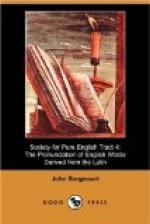Monosyllables ending in a vowel were pronounced long, those ending in a consonant short. Enclitics like que were no real exception as they formed part of the preceding word. There were, however, some real exceptions.
1. Pronouns ending in _-os_, as hos, quos. These followed eos and illos.
2. Words ending in _-es_, as pes, res.
3. Words ending in r, as par, fer, vir, cor, fur. These had that form of long vowel which we use in ‘part’, ‘fertile’, ‘virtue’, ‘cordate’, ‘furtive’.
In, disyllables the former vowel or diphthong, if followed by a single consonant, or by a mute and r, or by cl or pl, was pronounced long, a usage which according to Mr. Henry Bradley dates in spoken Latin from the fourth century. Examples are apex, tenet, item, focus, pupa, Psyche, C[ae]sar, f[oe]tus. I believe that at first the only exceptions were tibi, sibi, ibi, quibus, tribus. In later days the imperfect and future of sum became exceptions. Here perhaps the short vowel arose from the hideous and wholly erroneous habit, happily never universal though still in some vogue, of reciting er[’a]m, er[’a]s, er[’a]t. There are actually schoolbooks which treat the verse ictus, the beat of the chanter’s foot, as a word stress and prescribe terra trib[’u]s scopul[’i]s. I can say of these books only Pereant ipsi, mutescant scriptores, and do not mind using a post-classical word in order to say it.
In disyllables the former vowel or diphthong, if followed immediately by another vowel or diphthong, had the quality, and if emphatic also the quality, of a long vowel. The distinction was not recognized, and seems not to be generally acknowledged even now. We seem not to have borrowed many words which will illustrate this. We have however fiat, and pius was pronounced exactly as we pronounce ‘pious’, while for a diphthong we may quote Shelley,
Mid the mountains Euganean
I stood listening to the paean.
English derivatives will show the long quality of the vowels in aer, deus, coit, duo. To these add Graius.
The rule of apex applies also to words of more than two syllables with long penultima, as gravamen, arena, saliva, abdomen, acumen. The rule of aer also holds good though it hardly has other instances than Greek names, as Mach[’a]on, [AE]n[’e]as, Thal[’i]a, Achel[’o]us, Ach[’[ae]]i.




